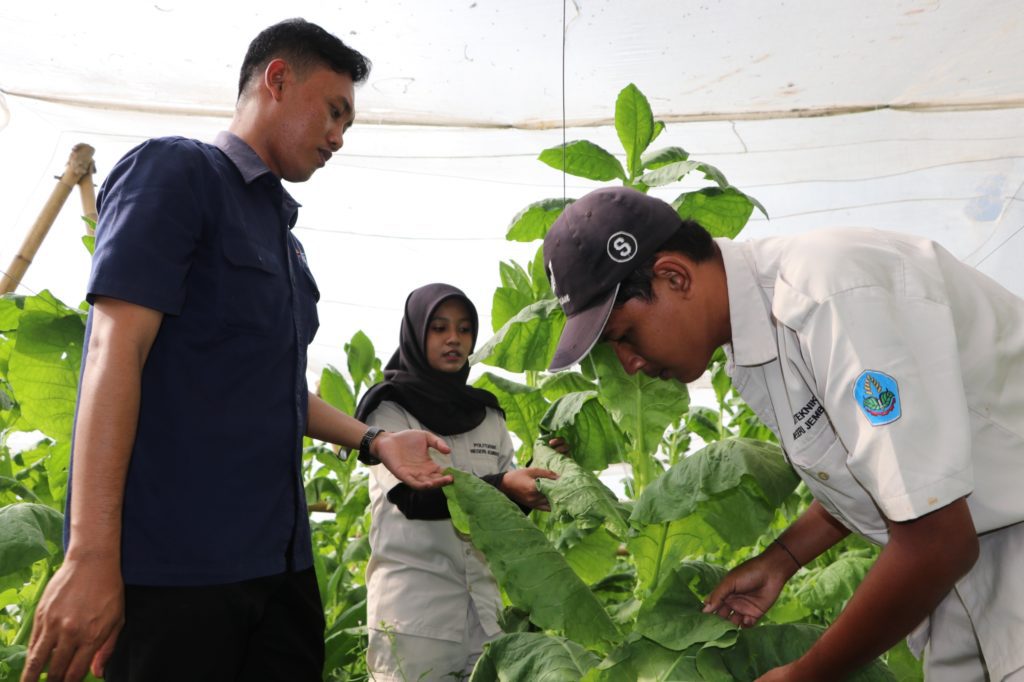

Politeknik Negeri Jember (Polije) students have again demonstrated their ability to create innovations in agriculture. Through the Project Based Learning (PBL) learning method, students from the Plantation Crop Production (PTP) Study Program succeeded in developing kasturi tobacco seedlings using an innovative nursery system known as Semi Fload Bed (SFB).
This PBL program was conducted as part of the Tobacco Crop Production and Integrated Pest Management course, with Ir. Siti Humaida, M.P., as the activity coordinator. Siti Humaida explained that the main objective of this PBL implementation is to produce high-quality kasturi tobacco seeds that can compete in the market, as well as provide practical experience to students in applying the latest innovations in the agricultural sector.
“The importance of this PBL is to broaden students’ horizons and skills by not only getting to know the new tobacco breeding system, but also learning more about SFB breeding techniques that are in line with the principles of Good Agriculture Practices (GAP),” she said.
In addition, students also gained a better understanding of the implementation of Standard Operational Procedure (SOP) in tobacco nursery, which is an important factor in producing high-quality seedlings. This PBL also opens up opportunities for students to develop entrepreneurial skills, especially in the production and marketing of kasturi tobacco seedlings that have high economic value.
“The kasturi tobacco seedlings that we developed have a number of advantages that make them superior in the market. One of the advantages is that these seeds are certified, which indicates that they meet the set quality standards. These seeds also have high germination, reaching 87%, which ensures that the seeds can grow well after planting,” she added.
In addition, Siti Humaida added that the kasturi tobacco seedlings are free from pests and diseases, and have roots that grow healthily, neatly, and regularly. The uniform size of the seedlings is also an added value, as this facilitates the planting and maintenance process. The seedlings are also designed to be easily removed from the tray without damaging the roots, which minimizes the risk of damage during transplanting.
“The use of trays in seedling rearing can provide additional benefits, such as facilitating seedling distribution and reducing the risk of damage during shipping. Raising seedlings using this method is also more efficient, saves labor and time, and maintains the quality of the seedlings until they reach consumers,” Siti Humaida explained.
Kasturi tobacco itself is known to have unique specifications such as a distinctive savory taste, the strong aroma produced by Kasturi tobacco is also one of the reasons why this tobacco is highly preferred by consumers.
In the implementation of this PBL, Polije did not work alone. This activity involves the Jember Kasturi Tobacco Farmers Association (APTK) as a strategic partner. This cooperation is very important, because APTK Jember partners play a role in assessing the quality of seeds produced by students.
“With this cooperation, all the SFB system kasturi tobacco seedlings that we produced, totaling 25,000 seedlings, were purchased by APTK Jember partners. This shows that the seeds produced by students have met the quality standards desired by the market,” he added.
Kasturi tobacco seedlings produced through PBL are expected to be produced and sold commercially, as part of strengthening the Teaching Factory (Tefa) Nursery Polije.
“So that Polije not only acts as an educational institution, but also as a center for innovation and development of highly competitive agricultural products at the national and international levels,” he concluded. (rda)